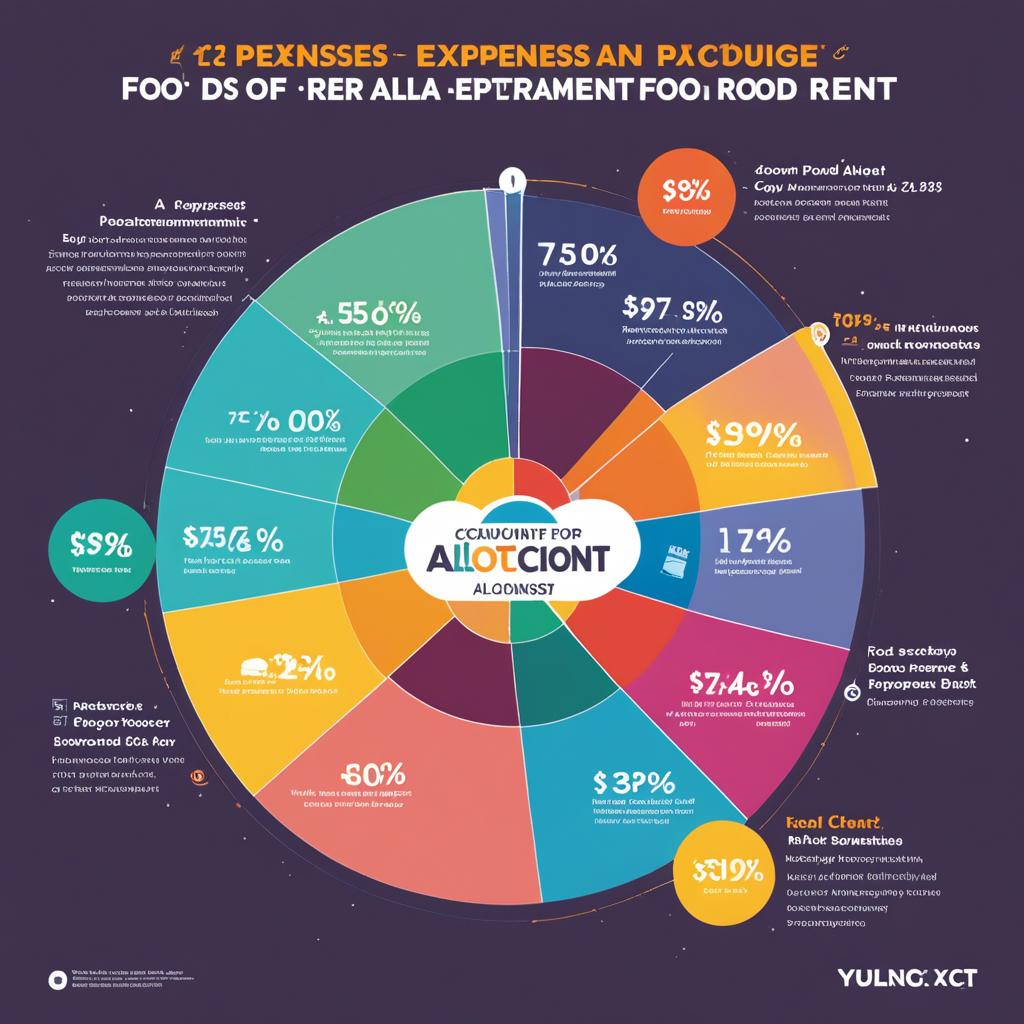Graduating from college is an exciting milestone, but it also comes with new financial responsibilities. To help college graduates navigate their post-college life, I have compiled the best money tips from various experts. These tips will provide guidance on budgeting, saving, investing, and more.
Key Takeaways:
- Create a budget to track your income and expenses.
- Start saving for retirement early to secure your financial future.
- Pay down high-interest debt to minimize long-term interest costs.
- Protect your credit by making payments on time and keeping your credit utilization low.
- Explore additional income streams to increase financial stability.
Start with a Budget
Creating a budget is the first step towards effective money management. By establishing a budget, you can gain control over your finances and make informed financial decisions that align with your goals. Here are some budgeting tips for college graduates:
- List Your Essential Expenses: Start by identifying the necessary expenses, such as rent, food, utilities, and transportation. These are the costs that you must cover each month.
- Determine Non-Essential Expenses: Once you have listed your essential expenses, assess how much you can allocate towards non-essential expenses like entertainment, dining out, or shopping. It’s important to set realistic limits to avoid overspending.
- Track Your Income and Expenses: Keep track of your income from sources such as your job, freelance work, or investments. Additionally, monitor your expenses and categorize them accordingly. This will help you identify areas where you can cut back and save more.
Budgeting allows you to prioritize your spending and focus on what matters most to you.
By starting with a budget, you can gain clarity on your financial situation and develop healthy financial habits. It’s a crucial step towards achieving your financial goals as a new college graduate.
Save for Retirement
As a recent graduate, it’s easy to think that retirement is too far away to worry about. However, starting to save early can make a significant difference in your financial future. By following these saving and investing tips, you can build a solid foundation for a comfortable retirement.
1. Start Saving Now
The key to saving for retirement is getting started as soon as possible. Even if you can only contribute a small amount, like 1% of your paycheck, it’s better than not saving at all. Over time, as your income grows, increase your savings rate to ensure a more robust retirement fund.
2. Consider High-Yield Savings Accounts
One way to supercharge your savings is by opening a high-yield savings account. These accounts offer higher interest rates than traditional savings accounts, allowing your money to grow more quickly. Research different options and choose an account that best suits your needs.
3. Explore Retirement Accounts
Retirement accounts like 401(k)s and Individual Retirement Accounts (IRAs) are excellent investment tools for long-term wealth accumulation. Take advantage of employer-sponsored retirement plans by contributing as much as you can, especially if there’s an employer match. Additionally, explore the benefits of opening your own IRA to supplement your retirement savings.
4. Diversify Your Investment Portfolio
When investing for retirement, it’s essential to diversify your portfolio. This means spreading your investments across different asset classes like stocks, bonds, and real estate. Diversification helps reduce risk and maximize potential returns. Consider consulting a financial advisor to develop an investment strategy that aligns with your goals and risk tolerance.
5. Stay Informed about Investment Options
Keep up with the latest investment trends and opportunities. Stay informed about different types of investments, such as mutual funds, index funds, and exchange-traded funds (ETFs). Educate yourself about the potential risks and rewards of each investment to make informed decisions.
“By starting early and making consistent contributions, you give your retirement savings a chance to grow and compound over time.”
Remember, saving for retirement is a marathon, not a sprint. By taking small steps now and implementing these saving and investing tips, you’ll be setting yourself up for a financially secure retirement in the future.
Pay Down High-Interest Debt
One of the most important steps you can take towards financial stability as a college graduate is to pay off high-interest debt, such as student loans or credit card debt. By prioritizing debt repayment, you can save money on interest payments and improve your credit score.
If you have multiple debts, start by making at least the minimum payments on all of them to avoid any negative consequences. However, it’s best to focus on paying down the debt with the highest interest rate first. This strategy, known as the debt avalanche method, will allow you to reduce the overall interest you’ll pay over time.
Here are some strategies to help you pay down high-interest debt:
- Allocate extra funds towards debt repayment: Look for ways to increase your income or cut back on expenses to free up extra money that can be used to pay off debt.
- Consider refinancing or consolidating: If you have student loans with high interest rates, explore options for refinancing or consolidating them into a lower-rate loan.
- Make biweekly or extra payments: Splitting your monthly payments in half and making them every two weeks can help reduce interest and shorten the repayment timeline.
- Negotiate lower interest rates: Reach out to your lenders and credit card companies to see if they are willing to lower your interest rates. This can make a significant difference in your repayment journey.
- Utilize windfalls and tax refunds: If you receive unexpected money, such as a work bonus or tax refund, use it to make a lump sum payment towards your debt.
Remember, paying down high-interest debt requires commitment and discipline. Stay focused on your goal of becoming debt-free, and celebrate your progress along the way.
Now that we’ve discussed paying down high-interest debt, let’s explore how you can protect your credit in the next section.
Protect Your Credit
Taking steps to protect your credit is essential for long-term financial health. As a recent college graduate, it’s important to be proactive in safeguarding your financial reputation. The following money management tips will help you preserve your credit and pave the way for a secure future.
Freeze or Lock Your Credit
One effective way to protect your credit is by freezing or locking it to prevent unauthorized access. Through this process, you restrict creditors from viewing your credit report, making it difficult for identity thieves to open new accounts in your name. Keep in mind that if you plan on applying for credit, you will need to temporarily unfreeze or unlock your credit.
Make Payments on Time
Consistently making your payments on time is vital for maintaining good credit. Late payments can negatively impact your credit score and lead to higher interest rates on future loans or credit cards. Set up auto-payments or reminders to ensure you never miss a payment due date.
Keep Credit Utilization Low
Credit utilization refers to the amount of available credit you use. It’s advisable to keep your credit utilization below 30% to demonstrate responsible credit management. Avoid maxing out your credit cards and aim to pay off balances in full each month to keep your credit utilization low.
Monitor Your Credit
Regularly monitoring your credit is essential to detect any fraudulent activity or errors on your credit report. Request a free credit report from each of the three major credit bureaus (Equifax, Experian, and TransUnion) annually. Additionally, consider signing up for a credit monitoring service that provides real-time updates and alerts for any changes or suspicious activity.
“Protecting your credit is like locking the door to your financial well-being. Take the necessary precautions to safeguard your financial reputation and prevent identity thieves from wreaking havoc.”
– Financial Expert
Create a Fraud Alert
Adding a fraud alert to your credit report can provide an extra layer of security. A fraud alert notifies lenders that they should verify your identity before extending credit in your name. This helps minimize the risk of identity theft and unauthorized access to your personal information.
Choose Strong Passwords
Using strong and unique passwords for your online banking and credit card accounts is crucial. Avoid common passwords and consider using a password manager to generate and securely store your login credentials.
| Tips to Protect Your Credit | Benefits |
|---|---|
| Freeze or Lock Your Credit | – Prevent identity theft – Control access to your credit report |
| Make Payments on Time | – Maintain a positive credit history – Avoid late payment fees and increased interest rates |
| Keep Credit Utilization Low | – Demonstrate responsible credit management – Improve credit score |
| Monitor Your Credit | – Detect fraudulent activity – Correct errors in credit report |
| Create a Fraud Alert | – Enhance credit report security – Verify identity when applying for credit |
| Choose Strong Passwords | – Protect online banking and credit card accounts – Prevent unauthorized access |
Explore Additional Income Streams
As recent graduates enter the workforce, it’s important to find ways to boost your income and achieve greater financial stability. One way to accomplish this is by exploring additional income streams beyond your primary job. These additional sources of income can help you pay off debt faster, increase your savings, and enhance your overall financial well-being.
If you’re looking to diversify your income, consider the following opportunities:
- Freelance Work: Utilize your skills and expertise by taking on freelance projects in your field. Platforms like Upwork and Freelancer connect individuals with freelance opportunities across various industries.
- Online Tutoring: If you excel in a particular subject, consider offering online tutoring services. Websites like Tutor.com and Chegg Tutors allow you to connect with students seeking academic support.
- Selling Products or Services: If you have a talent for crafting or creating, consider selling your products or services online. Websites like Etsy and Fiverr provide a platform for individuals to showcase and sell their unique offerings.
By exploring these avenues for additional income streams, you can not only increase your earnings but also gain valuable experience and develop new skills along the way. Moreover, having multiple sources of income provides a safety net in case one source is disrupted or faced with financial challenges.
Having diverse income streams contributes to your overall financial resilience and enables you to make progress towards your long-term financial goals. It’s essential to manage these different income sources effectively, keeping track of your earnings and ensuring you allocate your resources wisely.
“Diversifying your income not only provides financial security but also opens the door to new opportunities. By utilizing your skills and exploring different sources of income, you can take control of your financial future and create a more fulfilling career.”
Live Within Your Means
Avoid the temptation to overspend and live beyond your means. As a college graduate, it’s important to start off on the right financial footing by prioritizing budgeting and managing your expenses effectively. By living within your means, you will be able to create a strong foundation for your financial future.
Here are some budgeting tips for college graduates:
- Track your expenses: Start by understanding where your money is going. Keep a record of your income and expenses to have a clear picture of your spending habits.
- Create a realistic budget: Set financial goals and allocate your income accordingly. Prioritize your essential expenses, such as rent, utilities, and groceries, before allocating funds for discretionary spending.
- Avoid unnecessary debt: Be cautious about taking on unnecessary debt, such as credit card debt or high-interest loans. Only borrow what you truly need and can afford to pay back.
- Save first: Prioritize saving by setting aside a portion of your income before considering your discretionary spending. Even small amounts can add up over time and help you build an emergency fund.
- Cut unnecessary expenses: Evaluate your spending and identify areas where you can cut back. Consider reducing dining out, entertainment expenses, or subscription services that you don’t fully utilize.
- Plan for irregular expenses: Anticipate irregular expenses, such as car maintenance or medical bills, and set aside a specific amount each month to cover these costs.
- Be mindful of your wants vs. needs: Differentiate between essential and non-essential expenses. Focus on meeting your needs first before indulging in wants and luxury items.
- Stay accountable: Share your budgeting goals with a friend, partner, or family member who can help keep you accountable. Consider tracking your progress and rewarding yourself when you meet financial milestones.
Remember, finding a balance between enjoying your post-college life and being financially responsible is key. By implementing these budgeting tips, you can effectively manage your money, avoid unnecessary debt, and work towards achieving your financial goals.

Build an Emergency Fund
As recent college graduates, it’s crucial to start building an emergency fund to protect yourself from unexpected expenses. Whether it’s a sudden car repair or an unforeseen medical bill, having an emergency fund will provide you with financial security and peace of mind.
I recommend aiming to save three to six months’ worth of living expenses in your emergency fund. This will give you a comfortable cushion to fall back on during challenging times. Start small by setting aside a portion of your income each month and gradually increase your savings over time.
One way to make your emergency fund work harder for you is by storing it in a high-yield savings account. This type of account offers a higher interest rate than traditional savings accounts, allowing your money to grow more quickly.
The Benefits of Having an Emergency Fund
- Financial security in case of unexpected expenses
- Peace of mind knowing you have a safety net
- Reduced reliance on credit cards or loans
- Ability to handle emergencies without derailing your financial goals
“An emergency fund is like a financial parachute, providing a safety net when life throws unexpected challenges your way.” – [Expert Name]
Remember, emergencies can happen to anyone at any time. By building an emergency fund, you’re taking a proactive step towards securing your financial future and protecting yourself from unforeseen circumstances.
| Steps to Build an Emergency Fund | Action |
|---|---|
| 1 | Set a monthly savings goal |
| 2 | Automate your savings by setting up recurring transfers |
| 3 | Reduce unnecessary expenses to free up funds for savings |
| 4 | Monitor your progress regularly and adjust your savings plan if needed |
| 5 | Celebrate milestones along the way to stay motivated |
Choose Your First Job Wisely
When it comes to your first job after graduating, it’s important to think beyond just the salary. Consider factors such as benefits, growth opportunities, and workplace culture. This is a significant decision that can have a long-term impact on your career and financial prospects.
Choosing a job that aligns with your long-term goals and values is crucial. Look for companies that offer professional development programs, mentorship opportunities, and a clear path for advancement. These factors can help you grow and progress in your career.
Additionally, consider the benefits offered by the employer. Look for companies that provide health insurance, retirement plans, and other perks. These benefits can provide financial security and save you money in the long run.
Take the time to research potential employers and their workplace culture. Find companies that prioritize work-life balance, employee well-being, and a positive work environment. A supportive and inclusive workplace can contribute to your overall job satisfaction and success.
“Choose a job you love, and you will never have to work a day in your life.” – Confucius
Factors to Consider When Choosing Your First Job
| Factor | Description |
|---|---|
| Growth Opportunities | Assess the potential for career advancement, training, and development. |
| Workplace Culture | Evaluate the values, inclusivity, and atmosphere of the company. |
| Benefits | Consider the health insurance, retirement plans, and other perks provided. |
| Salary | Compare the offered salary to industry standards and cost of living. |
| Location | Consider the location’s cost of living, proximity to family, and lifestyle. |
By carefully evaluating these factors and choosing your first job wisely, you can set yourself up for a successful career and financial stability in the future.
Take Advantage of Employer Benefits
As recent college graduates enter the workforce, it’s important to explore and utilize the benefits offered by their employers. These benefits can provide valuable financial assistance and resources that can contribute to a solid financial foundation. By taking advantage of these opportunities, graduates can better manage their finances and plan for the future.
Health Insurance
One of the most significant benefits offered by many employers is health insurance coverage. It is essential to prioritize your health and secure insurance as you embark on your post-college journey. Explore the health insurance options provided by your employer and determine the coverage that best suits your needs. Health insurance can protect you from high medical expenses and provide peace of mind during unexpected health situations.
Retirement Plans
Another valuable benefit to consider is a retirement plan, such as a 401(k) or pension plan. These plans allow you to contribute a portion of your income towards retirement savings, providing you with a financial safety net for the future. Be sure to take advantage of any employer matching contributions, as this can significantly boost your retirement savings. It’s never too early to start planning for retirement, and the earlier you begin, the more time your investments have to grow.
Flexible Spending Accounts
Flexible spending accounts (FSAs) are another benefit to be aware of. FSAs allow you to set aside pre-tax money to pay for qualified expenses such as medical costs or dependent care. By utilizing an FSA, you can reduce your taxable income and potentially save money on taxes. Take the time to understand the specific rules and limits associated with your employer’s FSA program, as these may vary.
Additional Benefits
In addition to health insurance, retirement plans, and FSAs, employers may offer various other benefits such as life insurance, disability insurance, tuition assistance, or even gym memberships. These benefits are designed to support your overall well-being and provide financial protection in different areas of your life. Take the time to review the benefits package provided by your employer and understand all the available options.
By taking advantage of the benefits offered by your employer, you can save money, receive valuable financial assistance, and gain peace of mind. These benefits are designed to support your financial well-being and help you build a secure future.
Employer Benefits Comparison Table
| Benefit | Description |
|---|---|
| Health Insurance | Provides coverage for medical expenses and protects against high healthcare costs. |
| Retirement Plans | Allows you to save for retirement with the potential for employer matching contributions. |
| Flexible Spending Accounts | Enables you to set aside pre-tax money for qualified expenses, reducing your taxable income. |
| Additional Benefits | Varies by employer and may include life insurance, disability insurance, tuition assistance, and more. |
By comparing and understanding the benefits offered by your employer, you can make informed decisions about which benefits to utilize. Taking advantage of these benefits can save you money, provide financial security, and contribute to a strong financial future.

Prioritize Health Insurance
As recent college graduates, it’s crucial to prioritize your health insurance coverage as you transition into post-college life. Having health insurance not only provides protection against high medical expenses but also offers peace of mind.
Consider exploring options for health insurance through the marketplace or your employer. The health insurance marketplace offers a range of plans that cater to different needs and budgets. It’s important to compare the coverage, deductibles, and premiums of different plans to ensure you choose the one that best suits your requirements.
If you have the option to obtain health insurance through your employer, take the time to thoroughly understand the benefits and costs associated with each plan. Your employer may offer multiple options, such as HMOs (Health Maintenance Organizations) or PPOs (Preferred Provider Organizations), each with its own advantages and limitations. Make sure to review the coverage details and any additional perks or programs offered for preventive care or wellness initiatives.
By prioritizing health insurance, you can safeguard yourself against unexpected medical expenses and ensure that you have access to quality healthcare when you need it most.
Remember, your health is your wealth. Don’t let unexpected medical costs derail your financial stability and future plans. Take the necessary steps to secure adequate health insurance coverage and enjoy the peace of mind that comes with knowing you’re protected.
Avoid Impulsive Purchases
When it comes to managing your finances as a college graduate, one important aspect to consider is avoiding impulsive purchases. It’s easy to get caught up in the excitement of newfound freedom and disposable income, but making impulsive purchases can quickly derail your budget and financial goals.
Before making a purchase, take a moment to evaluate if it aligns with your budget and priorities. Consider whether it’s a necessity or a want. Is it something you can afford without compromising your other financial obligations? By taking the time to reflect on your purchase decisions, you can ensure that they are in line with your long-term financial goals.
One effective strategy to prevent impulse buying is to implement a cooling-off period before making a big purchase. This means giving yourself some time, like 24 to 48 hours, to think through the decision. During this time, you can evaluate whether the purchase is truly necessary or if it’s a fleeting desire that will fade away.
“The more distance we put between our impulses and our actions, the more likely we are to make prudent choices.”
By avoiding impulsive purchases, you can stay focused on your budgeting goals and make wise financial decisions that align with your long-term aspirations.

Impulsive Purchases and Financial Health
Impulsive purchases can have a significant impact on your financial health. They may lead to unnecessary debt, hinder your ability to save, and even strain your relationships and overall well-being. By resisting the urge to make impulsive purchases, you can maintain better control over your finances and work towards achieving your financial goals.
Pros and Cons of Avoiding Impulsive Purchases
| Pros | Cons |
|---|---|
| Helps you stay within your budget | Requires self-discipline and self-control |
| Prevents unnecessary debt | Can feel restrictive at times |
| Allows you to prioritize long-term financial goals | Requires patience and delayed gratification |
| Encourages mindful spending | May miss out on immediate enjoyment |
As seen in the table above, avoiding impulsive purchases offers numerous benefits that can contribute to your financial well-being. While it may require self-discipline and patience, the rewards of sticking to your budget and prioritizing your long-term goals make it worthwhile.
Understand Your Student Loans
As a recent college graduate, it’s crucial to have a clear understanding of your student loans and the available repayment options. Taking the time to educate yourself about your loans will empower you to make informed decisions and effectively manage your debt.
First, gather all the necessary information about your student loans, including the loan amounts, interest rates, and repayment terms. This will give you a comprehensive overview of your current debt and help you assess the best strategies for repayment.
Consider consulting with a student loan specialist to develop a personalized repayment plan that aligns with your financial situation. They can provide valuable advice on different repayment options and guide you through the process.
There are several repayment strategies available for college graduates. One option to explore is the Public Service Loan Forgiveness (PSLF) program, which forgives the remaining loan balance after you make 120 qualifying payments while working full-time for a qualifying employer. This program can be beneficial for those pursuing careers in public service or the nonprofit sector.
Another option is income-driven repayment plans. These plans set your monthly loan payments based on your income and family size, making them more manageable. They include plans such as Income-Based Repayment (IBR), Pay As You Earn (PAYE), and Revised Pay As You Earn (REPAYE).
It’s important to assess your financial goals and choose the repayment strategy that best fits your needs. Keep in mind that some repayment options may extend the repayment period but lower your monthly payments. Alternatively, you can choose to pay more than the minimum amount to pay off your loans faster and reduce the total interest paid.
Understanding your student loans will allow you to take control of your financial future and develop a repayment plan that aligns with your goals. Don’t hesitate to seek professional guidance and explore the available options to ensure a smooth and successful repayment journey.
Start Building Credit
Establishing good credit is crucial for future financial endeavors. Building a positive credit history early on will benefit you when applying for loans or renting apartments in the future. Here are some key steps to start building credit:
- Open a Credit Card: Consider opening a credit card in your name. Start with a basic card and make sure to use it responsibly.
- Pay Bills on Time: Pay all your bills, including credit card bills, on time to demonstrate your financial responsibility.
- Keep Credit Utilization Low: Aim to keep your credit utilization below 30% by managing your credit card balances.
Benefits of Building Credit
Gaining a positive credit history comes with several advantages:
“Establishing good credit early on provides greater access to financing options and better interest rates when applying for loans or credit cards. It also demonstrates financial responsibility, which can be attractive to landlords and potential employers.”
– Financial Advisor, Jane Smith
Credit Card Comparison
| Credit Card | Annual Fee | Interest Rate | Rewards |
|---|---|---|---|
| Ace Bank Rewards Card | $0 | 15.99% | 1% cash back on all purchases |
| Global Bank Platinum Card | $99 | 13.99% | 2x points on travel and dining |
Comparing credit card options can help you choose the right one based on your needs and financial goals.
Continue Expanding Financial Knowledge
To ensure long-term financial success, it’s important to continue expanding your financial knowledge and staying up to date with the latest trends and strategies. By continuously learning about personal finance, you’ll be able to make informed decisions and effectively manage your money. Here are some tips to help you broaden your financial knowledge:
Follow Financial Experts
One of the best ways to stay informed about personal finance is to follow financial experts who share valuable insights and advice. Look for reputable sources such as renowned finance bloggers, podcast hosts, or financial advisors. By following their content, you’ll gain access to valuable tips, industry news, and expert opinions.
Read Books on Personal Finance
Books are an excellent resource for deepening your understanding of personal finance. Look for titles written by renowned authors in the financial industry. Whether you’re interested in budgeting, investing, or building wealth, there’s a wide range of books available to cater to your specific interests and goals.
“The richest people in the world look for and build networks; everyone else looks for work.” – Robert Kiyosaki
Seek Advice from Professionals
Consulting with financial professionals can provide you with personalized guidance tailored to your individual needs. Seek advice from certified financial planners or financial advisors who can help you create a comprehensive financial plan and provide insights specific to your situation. They can help you assess your current financial situation, set short and long-term goals, and develop strategies to achieve them.

Join Online Financial Communities
Engaging with like-minded individuals who are also seeking financial knowledge can be both inspiring and educational. Joining online financial communities or discussions on platforms such as social media or personal finance forums can expose you to different perspectives, strategies, and success stories. Participating in these communities can also provide you with support and motivation on your financial journey.
Attend Financial Workshops or Webinars
Many organizations and institutions offer financial workshops or webinars on various topics such as budgeting, investing, and retirement planning. Take advantage of these opportunities to expand your financial knowledge. These workshops often provide interactive sessions where you can ask questions and gain practical insights from experts in the field.
By making a commitment to continue expanding your financial knowledge, you’ll gain the skills and confidence needed to make informed financial decisions. Remember, financial education is a lifelong journey, and staying informed is key to achieving your financial goals.
Conclusion
As you embark on your post-college journey, it’s crucial to take control of your financial future. By applying these best money tips for college graduates, you can start off on the right financial footing and build a secure future for yourself.
First and foremost, creating a budget is the foundation of effective money management. By tracking your income and expenses, you can make informed financial decisions and avoid overspending. Ensure that you prioritize essential expenses and set aside a portion for non-essential ones.
In addition to budgeting, focus on saving for retirement from an early stage. Even a small percentage of your paycheck can make a significant difference in the long run. Explore options like high-yield savings accounts or retirement accounts to grow your savings over time.
Furthermore, managing and paying down high-interest debt should be a priority. By making regular payments and tackling the debt with the highest interest rate first, you can minimize the amount you spend on interest and work towards financial freedom.
Protecting your credit is another crucial aspect of financial management. Freeze or lock your credit to prevent identity theft, and make sure to make all your payments on time. Maintaining a good credit score will help you secure better interest rates and financial opportunities in the future.
Lastly, never stop learning about personal finance. Stay updated with the latest financial advice, read books, and consult professionals when needed. Expanding your financial knowledge will empower you to make wise decisions and achieve long-term financial success.
By following these money management tips for college grads, you can navigate the transition from college to the real world with confidence. Remember, the choices you make today will have a lasting impact on your financial future, so make sure to prioritize smart money management.
FAQ
What is the importance of creating a budget?
Creating a budget is essential for good money management. It helps you track your income and expenses, make informed financial decisions, and avoid overspending.
How can I start saving for retirement as a college graduate?
Begin by saving at least 1% of each paycheck and gradually increase that amount over time. Consider opening a high-yield savings account or investing in a retirement account like a 401(k) or an IRA.
What should be my priority when it comes to paying off debt?
Prioritize paying off high-interest debt like student loans or credit card debt. Make at least the minimum payments on time to protect your credit score.
How can I protect my credit as a college graduate?
Consider freezing or locking your credit to prevent identity theft. Make all your payments on time and keep your credit utilization low.
How can I explore additional income sources after college?
Look for opportunities like freelance work, online tutoring, or selling products or services to diversify your income.
How can I live within my means after college?
Stick to your budget and prioritize your needs over wants to avoid overspending.
How can I build an emergency fund after college?
Start by setting aside a small amount each month and gradually increase your savings over time. Store your emergency fund in a high-yield savings account.
What factors should I consider when choosing my first job after college?
Consider factors like benefits, growth opportunities, and workplace culture, in addition to the salary.
How can I take advantage of employer benefits after college?
Explore the benefits offered by your employer, such as health insurance, retirement plans, and flexible spending accounts. Take advantage of any employer matching contributions to your retirement savings.
What is the importance of prioritizing health insurance after college?
Ensure you have health insurance coverage to protect yourself from high medical expenses and provide peace of mind.
How can I avoid impulsive purchases after college?
Evaluate whether a purchase aligns with your budget and priorities before making it. Consider waiting for a cooling-off period to make a well-thought-out decision.
How can I understand my student loans after college?
Consult with a student loan specialist to understand your repayment options and develop a personalized plan based on your financial situation.
How can I start building credit as a college graduate?
Consider opening a credit card in your name and using it responsibly. Pay your bills on time and keep your credit utilization low.
How can I continue expanding my financial knowledge after college?
Follow financial experts, read books, and seek advice from professionals to continue learning about personal finance.
Our Friends
- https://www.latimes.com/business/story/2024-06-10/financial-tips-for-new-college-grads
- https://www.thebalancemoney.com/the-best-financial-advice-for-new-college-graduates-1289592
- https://www.foxbusiness.com/personal-finance/7-money-moves-new-college-graduate-should-making
Money posts:
 Will Millennials Be Able to Retire? (2024)
Will Millennials Be Able to Retire? (2024)
 Retirement Financial Advisor: Types + Responsibilities (2024)
Retirement Financial Advisor: Types + Responsibilities (2024)
 Types of Life Insurance Policies Explained (2024)
Types of Life Insurance Policies Explained (2024)
 Rideshare Insurance: What It Is & Your Best Options (2024)
Rideshare Insurance: What It Is & Your Best Options (2024)
 Best Ways to Start Investing for College Students (2024)
Best Ways to Start Investing for College Students (2024)
 12 Places to Get a Money Order Near Me (2024)
12 Places to Get a Money Order Near Me (2024)
 How to Save Money in College: Effective Strategies (2024)
How to Save Money in College: Effective Strategies (2024)
 The Financial Planning Process: A Step-by-Step Guide
The Financial Planning Process: A Step-by-Step Guide

